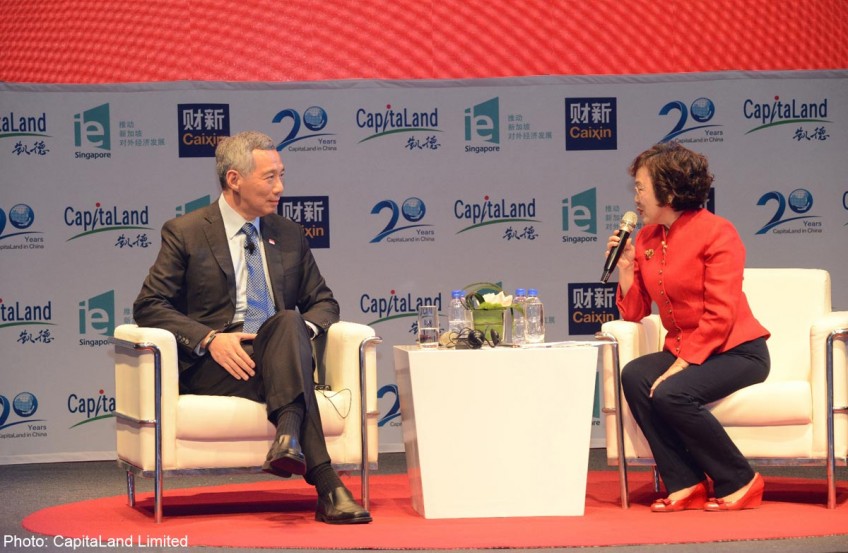PM Lee confident TPP can be done by early 2015

PRIME Minister Lee Hsien Loong has expressed confidence that the US-led Trans-Pacific Partnership (TPP) trade deal can be completed by early next year, as media reports said it is set to miss its year end deadline.
"If not this year, then we should be able to make it early next year," Mr Lee said here last night. "There are some small issues remaining but everyone knows it's the last 100m. We need to make a push."
Mr Lee was attending a gala dinner to celebrate Singapore property giant CapitaLand's 20th anniversary of operations in China and was asked during a dialogue about the high-standard trade pact. The TPP has missed several deadlines for completion as countries such as Japan have baulked at removing agriculture sector protection.
This morning, Mr Lee is scheduled to attend talks at the United States Embassy with leaders of the other 11 TPP countries.
Hopes had been high for a breakthrough at the session, but US Trade Representative Michael Froman yesterday ruled out any "major announcement".
Leaders of the 21-member Apec grouping are gathered in Beijing for the annual summit.
Asked by media group Caixin's chief editor Hu Shuli last night if US President Barack Obama's Asia visit would spur a breakthrough, Mr Lee replied in Mandarin that "to push TPP forward, you don't need to come to Asia".
"TPP's problems are domestic factors in each country," he said. "Can you persuade domestic sectors to accept greater foreign competition? With this, you have the chance to enter other countries' markets, and consumers also benefit.
So the decisive factor for the TPP is whether each country can make the decision and say, we will seize this. It is hard to do, but we hope we can do it."
There is also significant domestic resistance in the US to the trade deal, but Mr Obama has made its completion a priority for his trade agenda.
Mr Lee also voiced support for a Free Trade Area for the Asia-Pacific (FTAAP), a broader goal that China is pushing at this year's Apec. Its establishment would spur the lowering of trade barriers in Europe and the US, because it is the nature of trade agreements to build in momentum, he said.
He noted Apec itself was established 25 years ago because the then General Agreement on Tariffs and Trade (Gatt), a global trade body, was mired in disagreement.
Apec's creation spurred countries to complete Gatt negotiations, he said.
Earlier in the day, Mr Lee met Chinese President Xi Jinping on arriving in China.
Calling Singapore a country that has "created one miracle after another" in its development, Mr Xi told Mr Lee that Sino-Singapore ties have always been one step ahead of China's ties with other ASEAN countries. The two countries are exploring a third government-to-government project in China's western region, and Mr Xi said China would respect Singapore's views on what the project would entail and where it would be located.
Mr Lee congratulated Mr Xi on China's hosting of the 25th annual Apec summit and on "steering the meeting towards a substantive outcome".
China and Singapore will mark the 25th anniversary of the establishment of diplomatic relations next year. Mr Xi is scheduled to make a state visit to Singapore as will Singapore President Tony Tan Keng Yam, to China.
The Ministry of Foreign Affairs said that during their 30-minute meeting, Mr Xi and Mr Lee also exchanged views on the situation in Hong Kong as well as regional and international developments.
At the dialogue, Mr Lee addressed Singapore's joining of the Asian Infrastructure Investment Bank (AIIB), a new China-led multilateral lending institution that will support infrastructure investment in developing Asian countries.
US pressure reportedly got countries such as South Korea, Australia and Indonesia to stay away from the AIIB.
Asked if Singapore was concerned that it is one of just a few rich countries to sign on to the AIIB, Mr Lee said that Singapore would have joined the AIIB regardless of its stage of development.
"AIIB has value because developing countries need huge amounts of infrastructure investment," he noted, adding that Indonesia is likely to join the bank and that South Korea and Australia have not ruled out membership.
rchang@sph.com.sg

Get a copy of The Straits Times or go to straitstimes.com for more stories.